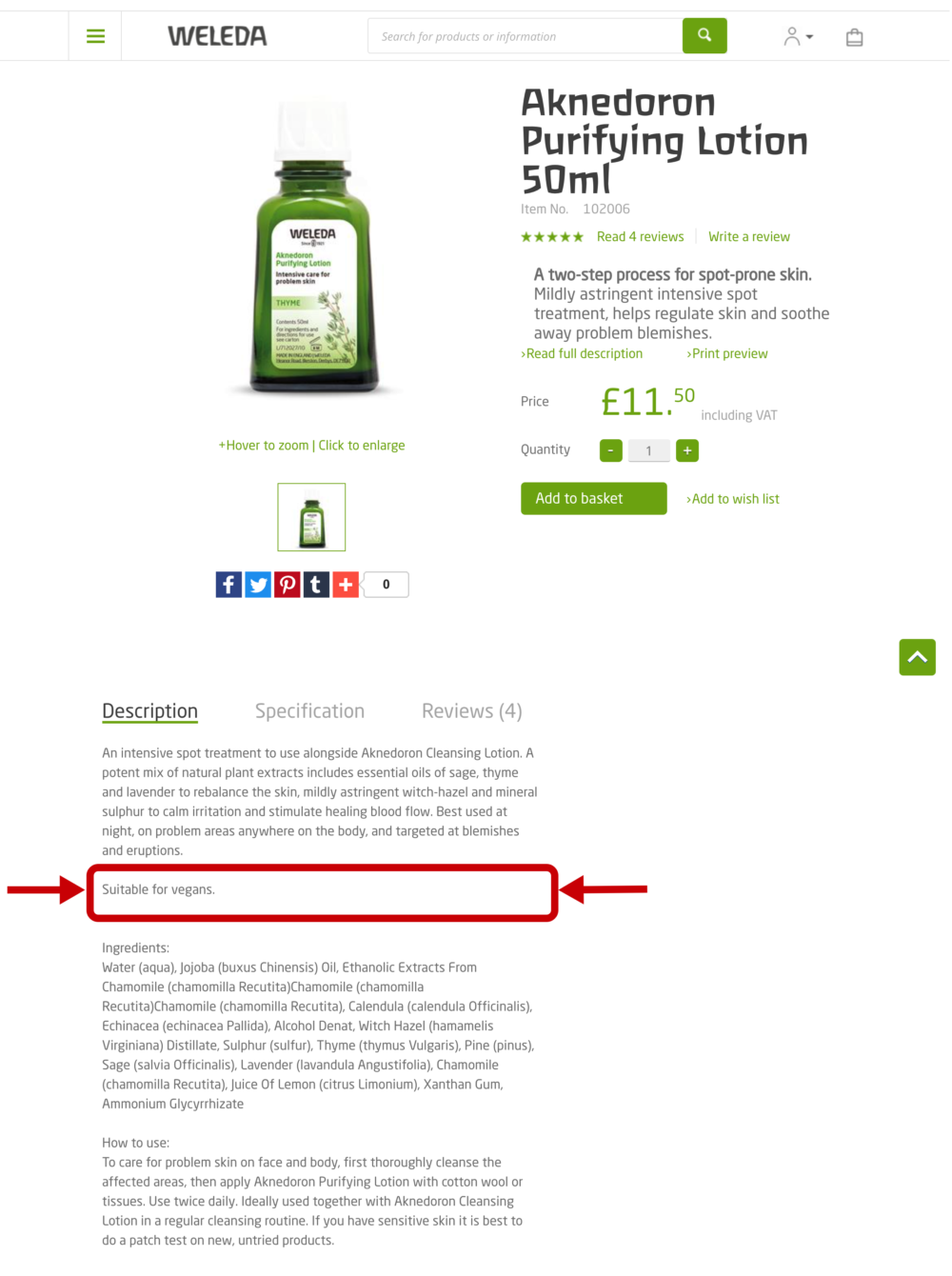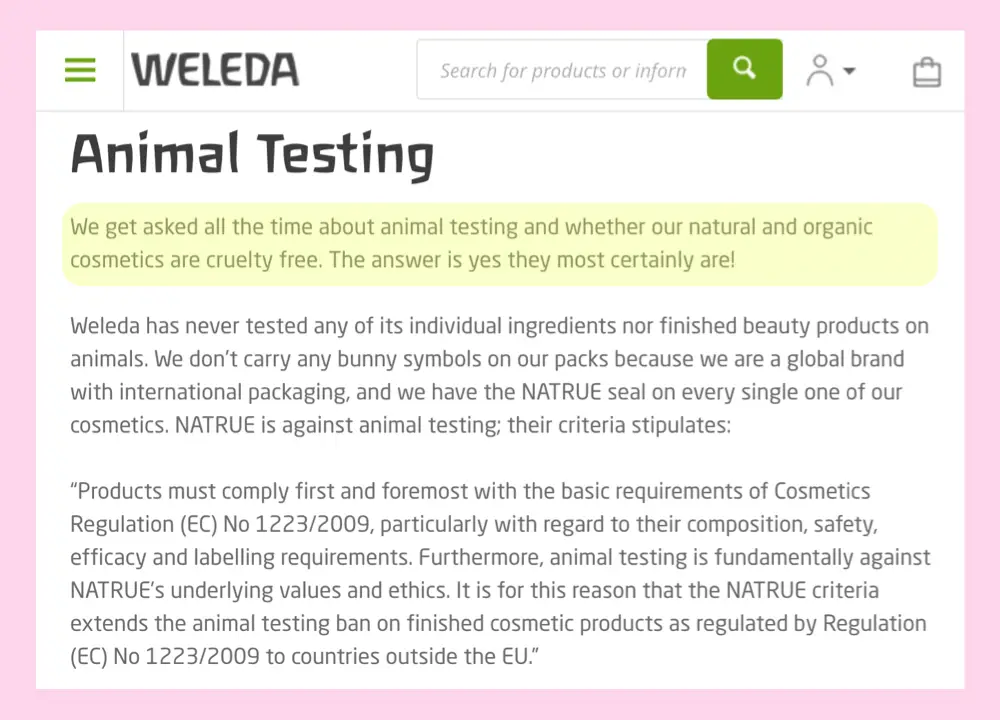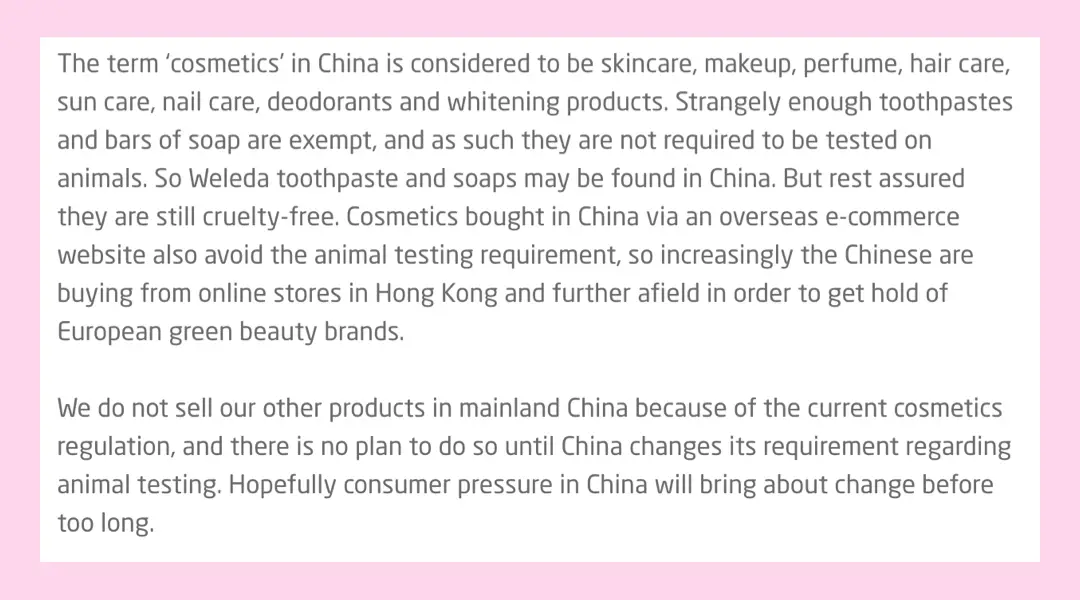Weleda is renowned for making natural cosmetics that holistically consider your health and wellbeing. But does this mean that the brand is cruelty-free and vegan too?
What we've learned has surprised us.
Weleda is cruelty-free. It doesn't conduct animal testing on its products, nor does it distribute its cosmetics where animal testing is required by law. While Weleda does offer a range of vegan cosmetics, it is not considered a vegan brand.
Weleda has a long history that dates back to 1920. It was founded by the physician Ita Wegman and the philosopher and scientist Rudolf Steiner.
Along with a group of other health specialists who applied their holistic mind-body-spirit approach to skincare – strong roots were formed for this brand that still holds strong 100 years later.
To develop premium natural products, Weleda uses anthroposophy – the study and relationship between plants and people.
In 2020 alone, Weleda brought in about €424 million revenue.
Before deciding on what to buy, here's what you need to know about Weleda's current animal testing policies, vegan ranges, formulation, and sustainability.
Is Weleda Cruelty-Free and Vegan?
Weleda is 100% Cruelty-Free
It does not:
Weleda is a Swiss-based company that claims to have rigorous cruelty-free standards. However, it does not have any accreditation from a third-party organization like Leaping Bunny.
Given that it makes all of its products within Germany, France, and Switzerland, it is covered by EU law that stipulates it is illegal to test and sell cosmetics or cosmetic ingredients tested on animals.
However, there are limits to the laws and regulations.
An organization like Leaping Bunny differs because it ensures all forms of testing (beyond ingredient and consumer safety), such as worker safety and environmental health, are considered.
Luckily, Weleda takes its sustainability and ethical responsibilities very seriously.
This brings us to the next point:
Weleda is Not Vegan
Although the brand is not entirely vegan, Weleda has a large variety of vegan ranges and products that are easy to find on their website.
Today, all its vegan products and ranges are marked on its website.
If a product is vegan, you'll find the information underneath its image after you've selected it.
Some of the most common animal-derived ingredients that Weleda uses include:
If you're interested in which products are vegan or finding vegan brand alternatives – keep reading or click on this link: Weleda vegan products.
Animal Testing Policy and History
Given Weleda's 100-year history – you'd think it might have tested on animals in the past, but the brand claims to have never tested on animals at all.
Something interesting to know – The name Weleda derives from the Germanic prophet and healer "Veleda".
It's always wanted to be respectful to nature, and this 100-year legacy shows it.
Cruelty-Free Status in 2021
Here is a screenshot of Weleda's official statement regarding its cruelty-free policies and vegan products, taken from its website:
Certification
It would be nice to see some certification from Weleda since it’s a proudly cruelty-free brand.
The EU legislature currently covers the brand, which is a really great start. However, certain loopholes in the law make it far more reliable if a third party were to get involved.
Leaping Bunny is the only internationally recognized cruelty-free organization. It's certification proves that:
You probably know PETA very well and wondering why its certification isn't enough?
Surprisingly, PETA doesn't hold the strictest cruelty-free regulations out there. So having certification from an association like Leaping Bunny is far more credible.
Just make sure you double-check any product you buy. Simply looking out for a bunny stamp at the back of your product bottle is NOT enough. A lot of brands are using fake logos to fool consumers.
Do your homework and see which products are genuinely cruelty-free first. This article will help you: Which Cruelty-Free Logos Can You Trust?
Is Weleda Sold Where Animal Testing is Required By Law?
Surprisingly, Weleda does distribute certain products to China.
However, it solely exports toothpaste and bars of soap which are not classified as cosmetics by Chinese law.
This means absolutely no animal testing is required on Weleda products in China.
China has a shocking track record. It is the country with the most amount of animal testing globally, with over 20 million animals used per year.
However, if you live in China or are concerned about its cruel beauty policies, there are a couple of loopholes to be aware of. Here's how to find cruelty-free cosmetics in China: Are Cosmetics Made in China Cruelty-Free?
What Weleda Products Are Vegan?
Weleda has a great range of vegan products that continues to expand. Not just in cosmetics, but overall natural healthcare too. Its UK website holds over 85 vegan products for you to choose from.
To save you some time, here are some of Weleda's award-winning products to choose from:
For a complete list of Weleda's vegan products, you can find them listed here: Weleda Vegan Product List
Vegan Alternatives to Weleda
Overall, Weleda is a great option for vegans and provides great vegan alternatives that other brands haven't cared to try yet, especially when it comes to natural ointments like Arnica gel.
They have a clean track record and noteworthy transparency with its consumers. For a multi-million dollar brand – it's commendable.
But, as much as we love that it is cruelty-free and offers vegan options – it would be great to see some more certification behind the claims.
If you do not support brands that aren't entirely vegan – Weleda might not be your first choice.
If you're looking for 100% vegan brands in the same price range, here are some options.
Is Weleda Natural and Organic?
Weleda is a NATRUE-certified natural or organic brand. It uses wild-crafted (from wild plants), as well as organic and biodynamic principles in its personal care products.
What are natural cosmetics?
The term "clean" or "natural" is not regulated for cosmetics and skincare. In other words, it doesn't hold one specific meaning.
In Weleda's case, it means a product is free of toxic synthetic ingredients and uses ingredients of immediate plant origin.
Here's the thing – "natural" is not always a good thing. Just because an ingredient is natural (take chili peppers, for example) doesn't mean you should rub it on your skin.
Weleda does a great deal of research to know what natural ingredients work well with human skin and provide substantial health benefits.
Does Weleda Use Safe Ingredients?
According to Skin Safe, Weleda has an exceptional 91% - 100% allergen-free ranking for each product.
Weleda's products are free of allergens such as common preservatives, MCI/MI, nickel, parabens, soy, propylene glycol, and dye.
Reading the ingredient list is crucial because Weleda is not 100% hypoallergenic or non-comedogenic, and they do not claim to be.
However, certain products are specifically for these concerns, so make sure you buy what your skin needs.
It's also important to note that not all common allergens are bad ingredients overall. A common example is lanolin.
The UK & EU Have Stricter Ingredient Regulations
Since Weleda is based and made in the EU – ingredient regulations are much stricter than in the US.
This is because the FDA has only banned or restricted 11 harmful chemicals from cosmetics. Europe, on the other hand, has banned 1,328!
Some common skincare ingredients that are banned in the EU but not in the USA include:
Beyond the 1,328 banned ingredients, Weleda also does not use synthetic ingredients. It only uses essential oils and plant extracts.
Are Cruelty-Free Ingredients Safe?
If you're worried about how safe it is to use cosmetics that are not tested on animals – please relax and take a sigh of relief.
There is no reason why cruelty-free products shouldn't be just as safe, if not safer, than anything tested on an animal.
Not only is it easy to test ingredients without using animals altogether, but there are so many pre-approved ingredients you can use to make cosmetics that there really is no need.
If you're interested, here's more on the subject: Are Cruelty-Free Cosmetics Safe?
Is Weleda Sustainable and Ethical?
Weleda is one of the original pioneers in clean cosmetics that undertakes a strong sustainability and ethical message as it ties in with its company values.
This means that the brand:
It's no secret that the world has a huge waste problem, and cosmetic brands are only making it worse by using unsustainable packaging and harmful ingredients.
Some of the ways Weleda is taking strong environmental accountability is by:
We love to see where Weleda is right now – and we're looking forward to seeing their sustainability plans for the future.
Final Thoughts
Weleda is a well-developed skin and body care brand that strives to be all-natural, sustainable, and healthy for you.
The fact that it is an EU brand that solely makes its products within the EU is a great sign that they are completely cruelty-free and use safe ingredients for your skin.
We appreciate the fact that it has a transparent supply chain and is open to the public about its testing, purchasing, and distribution policies.
We also love the fact that it's open about using eco-friendly ingredients and limited palm oil.
Since Weleda is not 100% vegan – it might not be the best choice for activists who go the extra mile. However, we would keep an eye out for its vegan ranges because they are well-formulated and safe.
But, of course, even if it is an EU-based brand, we would still like to see Leaping Bunny accreditation.



